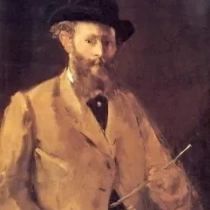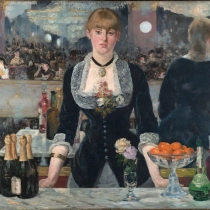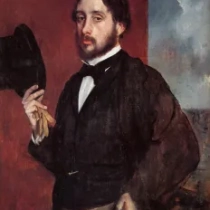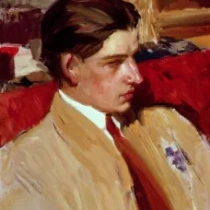 1832 - 1883
impressionism, realism
1832 - 1883
impressionism, realism
Description Edouard Manet
Edouard Manet, born in Paris in 1832, emerged as a revolutionary force in the 19th-century art scene, challenging conventions and setting the stage for modernism. Despite his privileged background, Manet's art echoed the tumult of his time. Rejecting academic norms, he embraced the controversial, epitomized by his seminal work "Olympia," where a nude gazes defiantly at the viewer.
Manet's avant-garde approach to painting irrevocably altered the trajectory of art. His affinity for urban subjects, captured with bold brushstrokes and a penchant for modern themes, earned him both admiration and criticism. "Le Déjeuner sur l'herbe" and "A Bar at the Folies-Bergère" stand as testaments to his ability to fuse traditional genres with a contemporary edge.
At the crossroads of Realism and Impressionism, Manet forged a path uniquely his own. His friendship with the Impressionist circle influenced his palette, embracing lighter tones and capturing the transient effects of light. Yet, Manet retained a distinct identity, navigating the artistic currents with a relentless pursuit of individual expression.
Manet's art mirrored his engagement with Parisian society. His portraits, including "Portrait of Emile Zola," were psychological studies that transcended mere likeness. His engagement with the Paris Salon and his refusal to conform to established norms positioned him as a harbinger of artistic independence.
The artist's life was a paradox of rebellion and tradition. Married to Suzanne Leenhoff, his former piano teacher, he defied societal expectations. Despite financial struggles and bouts of ill health, Manet's commitment to his craft remained unwavering.
Manet's untimely death in 1883 marked the end of a transformative artistic journey. His legacy, however, lived on in the works of artists like Degas and Monet, who drew inspiration from his audacious spirit. Edouard Manet, the dandy of Parisian art, left an indelible imprint, not just on canvas but on the very fabric of modern artistic consciousness.
Gallery
Paintings Edouard Manet
Quotes
There are no lines in nature, only areas of color, one against another.
I paint what I see and not what others like to see.
It is not enough to know your craft—you have to have feeling. Science is all very well, but for us imagination is worth far more.
I am influenced by everybody. But every time I put my hands in my pockets, I find someone else's fingers there.
One must be of one's time and paint what one sees.
F.A.Q Section
"Olympia" (1863): A provocative painting featuring a reclining nude woman, challenging traditional representations of the female form.
"Luncheon on the Grass" (1863): A groundbreaking composition depicting a nude woman picnicking with two clothed men in a natural setting.



No Comments Yet...